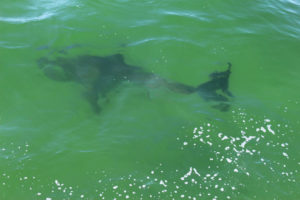 HYANNIS – Local shark researchers are waiting on the release of anticipated federal funding to conduct a two-year study which will attempt to identify when water conditions are ripe for an increased presence of white sharks.
HYANNIS – Local shark researchers are waiting on the release of anticipated federal funding to conduct a two-year study which will attempt to identify when water conditions are ripe for an increased presence of white sharks.
Greg Skomal, a senior biologist with the Division of Marine Fisheries, and Megan Winton, a research scientist with the Atlantic White Shark Conservancy, will use tagging data collected from receivers over the past decade to identify relationships between environmental conditions and white shark presence off Cape Cod.
“What we are going to be looking at relationships with things like sea surface temperature and water turbidity – things that have been correlated with the presence of white sharks off the coast in other areas – and we are going to be seeing if those relationships hold up for white sharks off the coast of the Cape,” Winton said.
The researchers would then pair those relationships with near-real-time satellite observations of different environmental conditions to forecast white shark presence at locations off the coast of the Cape.
“We are basically going to be using this as an improved outreach vector to let people know when the probability of white sharks being present off the coast is high,” Winton said.
The study would provide another way of getting information and data collected over the past several years out the public.
Winton said it is important for the public to recognize that the study will not be trying to predict the location of an individual white shark.
“Predicting where, when and how an animal is going to move and where they are going to be is very difficult,” she said.
The main goal of the project is to develop a model using the data and then testing it.
“We’ll be testing it using whole chunks of data and seeing how well the model does at predicting whether a shark was in the area or not,” Winton said.
If the relationships hold and tests reveal the model is a useful product, it could be incorporated into the Atlantic White Shark Conservancy’s Sharktivity app and website.
“We’ll be working with local towns and beaches to post that information to give people a better idea of when and where the probability of white shark occurrences is high,” Winton said.
Winton said many locals just assume that everybody knows that white sharks are common off the coast of Cape Cod during the summer tourist season.
“You’d be surprised at how many people you talk to and how many tourists in particular you talk to who are still not aware that white sharks are there,” she said. “This is really going to be a way that we can improve our outreach efforts and let people know when the peak white shark season is.”
Winton said it is tough discussing the study because none of the work has been conducted due to the uncertainty of the federal funding. The grant funding is still tied up in the budget process and hasn’t been awarded yet.
A postdoctoral student would be hired to help analyze the data collected from buoys around the coast.
They hope to hear about the availability of the funding this spring.
Since 2014, research led by DMF and the conservancy has been conducted to get a more accurate picture of how many sharks spend their summers on the Cape.
This past tagging season the Conservancy fitted 50 great whites in Cape Cod waters with tracking and data-logging devices and in June they began to conduct new research focused on getting a better understanding of the predatory behavior of white sharks in the region.
























